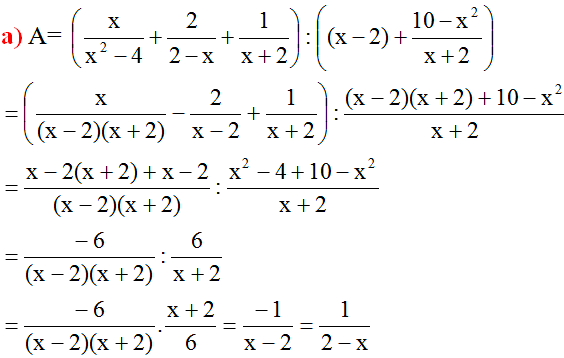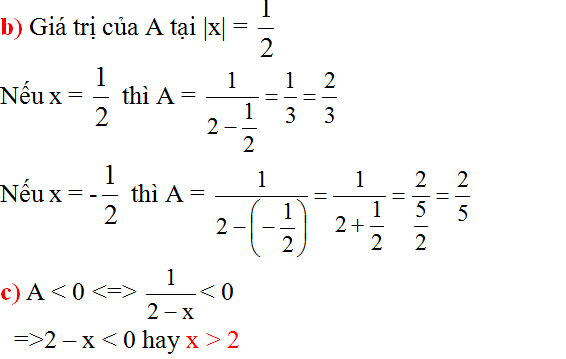Hãy nhập câu hỏi của bạn vào đây, nếu là tài khoản VIP, bạn sẽ được ưu tiên trả lời.

Lời giải của bạn Nhật Linh đúng rồi, tuy nhiên cần thêm điều kiện để A có nghĩa: \(x\ne\pm2\)

a: A=[(3x^2+3-x^2+2x-1-x^2-x-1)/(x-1)(x^2+x+1)]*(x-2)/2x^2-5x+5
=(x^2+x+1)/(x-1)(x^2+x+1)*(x-2)/2x^2-5x+5
=(x-2)/(2x^2-5x+5)(x-1)

Câu 1:
a: \(A=\dfrac{x+1-x+1}{\left(x-1\right)\left(x+1\right)}\cdot\dfrac{x^2+1-2x}{2}\)
\(=\dfrac{2}{\left(x-1\right)\left(x+1\right)}\cdot\dfrac{\left(x-1\right)^2}{2}=\dfrac{x-1}{x+1}\)
b: Để A=x/6 thì \(\dfrac{x-1}{x+1}=\dfrac{x}{6}\)
\(\Leftrightarrow x^2+x-6x+6=0\)
=>x=3 hoặc x=2

B3;a,ĐKXĐ:\(x\ne\pm4\)
A=\(\left(\dfrac{4}{x-4}-\dfrac{4}{x+4}\right)\dfrac{x^2+8x+16}{32}=\left(\dfrac{4x+16}{x^2-16}-\dfrac{4x-16}{x^2-16}\right)\dfrac{x^2+2.4x+4^2}{32}=\left(\dfrac{4x+16-4x+16}{x^2-16}\right)\dfrac{\left(x+4\right)^2}{32}=\left(\dfrac{32}{x^2-16}\right)\dfrac{\left(x+4\right)^2}{32}=\dfrac{32\left(x+4\right)^2}{32.\left(x-4\right)\left(x+4\right)}=\dfrac{x+4}{x-4}\\ \\ \\ \\ \\ \\ b,Tacó\dfrac{x+4}{x-4}=\dfrac{1}{3}\Leftrightarrow3x+12=x-4\Leftrightarrow x=-8\left(TM\right)c,TAcó\dfrac{x+4}{x-4}=3\Leftrightarrow x+4=3x-12\Leftrightarrow x=8\left(TM\right)\)

\(A=\dfrac{x-2014}{\dfrac{x^2-4x+4-x^2-2x-1}{\left(x+1\right)\left(x-2\right)}:\dfrac{x^2-4x+4+x^2+2x+1}{\left(x+1\right)\left(x-2\right)}}\)
\(=\dfrac{x-2014}{\dfrac{-6x+3}{\left(x+1\right)\left(x-2\right)}\cdot\dfrac{\left(x+1\right)\left(x-2\right)}{2x^2-2x+5}}\)
\(=\left(x-2014\right)\cdot\dfrac{2x^2-2x+5}{-6x+3}\)
Để A>=0 thì \(\left(x-2014\right)\left(-6x+3\right)>=0\)
\(\Leftrightarrow\left(2x-1\right)\left(x-2014\right)< =0\)
=>1/2<x<=2014

Câu 2:
a) \(ĐKXĐ:x\ne1\)
\(A=\left(\frac{1}{x-1}-\frac{2x}{x^3+x-x^2-1}\right)\div\left(1-\frac{2x}{x^2+1}\right)\)
\(\Leftrightarrow A=\left(\frac{1}{x-1}-\frac{2x}{\left(x-1\right)\left(x^2+1\right)}\right)\div\frac{x^2-2x+1}{x^2+1}\)
\(\Leftrightarrow A=\frac{x^2+1-2x}{\left(x-1\right)\left(x^2+1\right)}\div\frac{\left(x-1\right)^2}{x^2+1}\)
\(\Leftrightarrow A=\frac{\left(x-1\right)^2\left(x^2+1\right)}{\left(x-1\right)\left(x^2+1\right)\left(x-1\right)^2}\)
\(\Leftrightarrow A=\frac{1}{x-1}\)
b) Để A > 0
\(\Leftrightarrow x-1>0\)(Vì\(1>0\))
\(\Leftrightarrow x>1\)

a,ĐK: \(\hept{\begin{cases}x\ne0\\x\ne\pm3\end{cases}}\)
b, \(A=\left(\frac{9}{x\left(x-3\right)\left(x+3\right)}+\frac{1}{x+3}\right):\left(\frac{x-3}{x\left(x+3\right)}-\frac{x}{3\left(x+3\right)}\right)\)
\(=\frac{9+x\left(x-3\right)}{x\left(x-3\right)\left(x+3\right)}:\frac{3\left(x-3\right)-x^2}{3x\left(x+3\right)}\)
\(=\frac{x^2-3x+9}{x\left(x-3\right)\left(x+3\right)}.\frac{3x\left(x+3\right)}{-x^2+3x-9}=\frac{-3}{x-3}\)
c, Với x = 4 thỏa mãn ĐKXĐ thì
\(A=\frac{-3}{4-3}=-3\)
d, \(A\in Z\Rightarrow-3⋮\left(x-3\right)\)
\(\Rightarrow x-3\inƯ\left(-3\right)=\left\{-3;-1;1;3\right\}\Rightarrow x\in\left\{0;2;4;6\right\}\)
Mà \(x\ne0\Rightarrow x\in\left\{2;4;6\right\}\)


